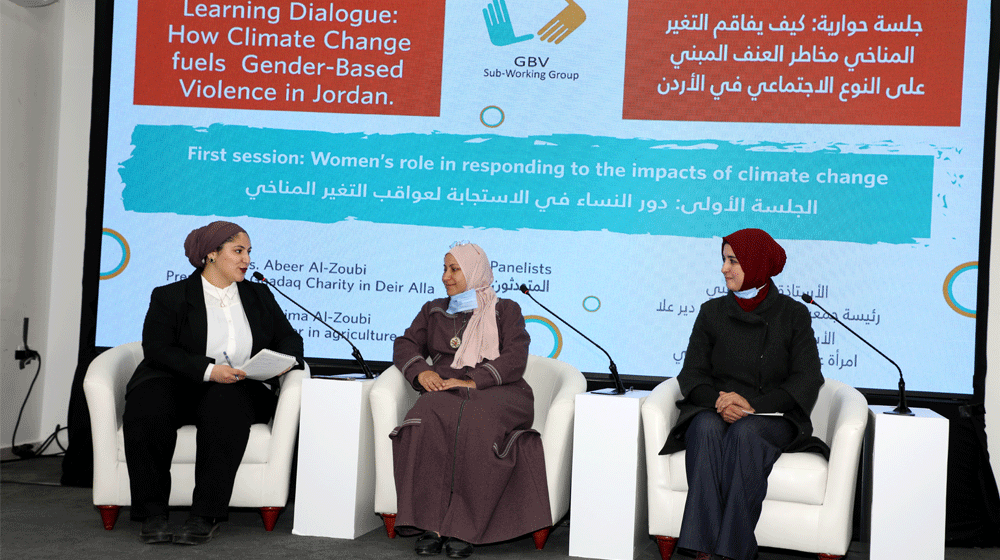AMMAN, Jordan – On March 7th, 2022 and in celebration of the International Women’s Day, the Gender-Based Violence Sub-Working Group co-chaired by UNFPA and UNHCR organized a hybrid learning dialogue with experts and women contributors to climate change action, to understand the impact of climate change on exacerbating the risks of GBV against women and girls in Jordan. The learning dialogue was organized by the International Women’s Day taskforce of the GBV SWG which consisted of 16 organizations including UN agencies, INGOs, NGOs and women’s organizations.
The learning dialogue was streamed on Zoom webinar from the office of the Institute for Family Health (IFH). More than 45 participants joined the webinar.
The learning dialogue started with opening remarks by Ms. Pamela Di Camillo, GBV Specialist at UNFPA Jordan where she shed light on the importance of the joint collaborations and partnerships between the environmental sector and the GBV sector, followed by Ms. Tayba Sharif, Senior Protection Officer at UNHCR where she also echoed the need for continuous joint efforts among sectors to ensure a better response to the risks of GBV and in particular domestic violence, sexual harassment and child marriage that might increase due to the impacts of climate change.
The learning dialogue was divided into three sessions, starting with the first session on reflecting the roles of women in contributing to climate change action, by presenting the stories of Ms. Abeer Al-Zoubi, President of the Ghadaq Charity and a handicraft expert, in addition to Ms. Basima Al-Zoubi, a Syrian refugee woman working in agriculture who also shared the challenges they face including societal pressure and the unequal social norms that stand against their participation, but as Ms. Bassima quoted “We are capable of everything, and we can stand against all challenges!”.
Following with the second session that started with Ms. Sara Al-Haleeq, Head of Adaptation Section at the Ministry of Environment in Jordan who reflected on the climate change situation in Jordan and the role of the Ministry in the implementation of the different policies that respond to impacts of climate change on the lives of women and girls in Jordan. “Jordan was one of the first governments in the region to put in place a Gender and Climate Change Strategy, the "Program for Gender Mainstreaming in Climate Change Efforts in Jordan 2010.", integrating gender perspectives into climate, environmental and disaster risk reduction policies and programs.” said Ms. Haleeq. Ms. Razan Makahleh, in her turn, reflected on the situation in Azraq Camp stating that water scarcity impacts the well-being of women especially due to the unequal distribution of water resources, that affects them in managing the menstruation cycle.
The learning dialogue ended with the session on understanding the linkages between climate change and gender-based violence that were presented by Ms. Jude Sajdi, Founder and Managing Director of Sama Consulting and Ms. Maysa Farraj, Programs Manager at the Jordanian Women’s Union. In that regard, UNFPA Jordan has developed a research brief paper that added a ground for the understanding of that linkage and called for actions and recommendations to enhance the understanding to ensure proper response.
The full discussion can be heard on UNFPA Jordan’s YouTube Channel: https://www.youtube.com/watch?v=1cREoNzkx4M&t=3614s


